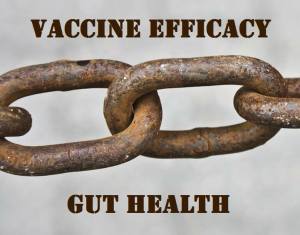 While doing some reading, I came across a very interesting article regarding vaccine efficacy and the gut, titled, “Researchers Link Vaccine Effectiveness To Gut Bacteria,” based on a study titled “TLR5-Mediated Sensing of Gut Microbiota Is Necessary for Antibody Responses to Seasonal Influenza Vaccination.”
While doing some reading, I came across a very interesting article regarding vaccine efficacy and the gut, titled, “Researchers Link Vaccine Effectiveness To Gut Bacteria,” based on a study titled “TLR5-Mediated Sensing of Gut Microbiota Is Necessary for Antibody Responses to Seasonal Influenza Vaccination.”
“U.S. researchers have found a link between intestinal bacteria and the effectiveness of the flu vaccine. And the finding could have important implications for how vaccines are given.”
Two simple sentences, and the world of vaccines was just thrown a curve ball: the gut could be playing a part in how effective a vaccine is.
For many years (more years than I have had children), proponents of vaccine safety have been raising questions about the idea of the “one size fits all” approach of our vaccine schedule. The concerns have been over many things: the concentrations of certain ingredients exceeding safe levels for little ones, the use of the same schedule for children with health concerns, including prematurity, as those who are very healthy, the lack of information on how maternal or family health impacts vaccination outcome, the lack of information we have on a newborn’s ability to handle vaccines when we begin vaccinating, the lack of information on whether boys and girls handle vaccines the same way, and the schedule in and of itself, which has never been studied as a whole in this regard. The proponents of vaccines, however, have remained steadfast in the position that vaccines are thoroughly vetted in the trials, that “one size fits all” is okay, and that there are plenty of people who have looked at the vaccines and agree that vaccines wouldn’t be on the market if they were not safe and effective. Kind of a stalemate, each believing that their arguments have merit (and they do, at least to an extent). Until now, however, the discussion about the “one size fits all” policy has circled mainly around SAFETY. This article is not about safety (although it does open many other questions), but about whether or not “one size fits all” is even a smart approach when it comes to a vaccine’s effectiveness. And this is something that should have people of all opinions scratching their heads over.
The study started with researchers giving mice an influenza vaccine and an antibiotic treatment. For those who aren’t following, they killed off the “good bacteria” with the antibiotics in a portion of the mice in order to test the efficacy of the influenza vaccine in both those with healthy guts and those lacking. Basically they created a bad gut to compare against a good gut. The question being how does a healthy gut (or not healthy gut) impact the effectiveness of a vaccine?
What they found was that the mice that had been treated with the microbe-killing antibiotic did not have the same antibody response to the vaccine. In other words they saw a “substantial drop” in the efficacy of the vaccine. They found the same issue with the polio vaccine.
***SIDE NOTE*** The researchers said that gut health did not affect the efficacy of the yellow fever vaccine, which is not on our recommended schedule. They also said that it did not affect the vaccines that had already added adjuvants to boost immune response. In the U.S., the only licensed adjuvants are aluminum gels or aluminum salts. (Aluminum is one of the vaccine ingredients whose safety is hotly debated.) The following vaccines do not contain adjuvants and could possibly be included in the discussion over vaccine efficacy and gut health: measles, mumps, and rubella (MMR), rotavirus, polio (IPV), influenza, and varicella. Those vaccines that do contain adjuvants are hepatitis A & B, DTaP, Hib, and pneumococcal; although the article does not mention exactly which vaccines were studied, it says that the efficacy of those with adjuvants did not appear to be changed.
 Now before everyone gets too crazy, this was a study done in mice — only the first step in determining whether the effect has any applicability to humans. However, it should make something very clear to everyone. The science on vaccines is NOT in. In fact, science continually evolves based on new information. There should never be topics too “hot button” that we stop going down the path of discovery. Those who say that the science is in, and we aren’t going to discuss efficacy or safety anymore, are a detriment to all of us. They are putting our health at risk with their arrogance and creating a huge amount of distrust in the public. This isn’t about who is right or wrong; this is about doing all we can to protect people both from disease and from vaccine risk. I applaud this research team and their search for important answers regarding whether or not underlying factors may contribute to the outcome of vaccination.
Now before everyone gets too crazy, this was a study done in mice — only the first step in determining whether the effect has any applicability to humans. However, it should make something very clear to everyone. The science on vaccines is NOT in. In fact, science continually evolves based on new information. There should never be topics too “hot button” that we stop going down the path of discovery. Those who say that the science is in, and we aren’t going to discuss efficacy or safety anymore, are a detriment to all of us. They are putting our health at risk with their arrogance and creating a huge amount of distrust in the public. This isn’t about who is right or wrong; this is about doing all we can to protect people both from disease and from vaccine risk. I applaud this research team and their search for important answers regarding whether or not underlying factors may contribute to the outcome of vaccination.
The last three paragraphs of this article really stand out to me as evidence that we have a lot of things we need to be studying and, sadly, progress is likely to be impeded by fear of what will happen if the public starts doubting our vaccination system:
If the relationship between intestinal bacteria and vaccine effectiveness does hold in humans, it has some interesting implications. For example, the microbe population can vary by geography. It definitely varies by age; children under age two are still developing their gut bacteria.
“Within the first two years of life, children get vaccines,” he observed. “I think an important question that deserves to be looked at experimentally is if there’s any correlation or link between the composition of microbiota in infants and immunity to vaccinations.”
If the animal studies are replicated in human tests, it may affect how and when people get vaccinations.
This leaves me with so many questions — and I am sure others will have many more. But here are a few of the things that keep running through my mind:
- Does this mean that we have been recommending vaccines for our little ones that may not have been working? If that is the case (and we don’t know yet), then how have we made these efficacy claims all these years and nobody caught this? And most importantly if it’s true, then we need to be honest about this and back off as the benefits clearly do not outweigh the risks.
- This could potentially mean that the three rotavirus, one measles/mumps/rubella, one varicella, three polio, and two influenza shots recommended by age two could all be pointless. That’s a large portion of the recommended schedule that could need revision. What impact does this have, and will the worry over the consequences of growing distrust in the vaccine program contine to trump doing what is best for children?
- This definitely brings into question the “one size fits all” approach to vaccines, but how do we use the knowledge we have (and the knowledge we don’t yet have) to individualize care? What kind of practice guidelines could we have, as gut health alone could affect millions? What kind of screenings could be done to make sure we have all possible information necessary to make vaccines both effective and safe before we proceed?
- How many people could this affect? It’s hard to even wrap your head around something that could possibly affect so many. As the article said, there are a lot of variables involved from age and health status to obscure things such as where you live. How do we study vaccines’ efficacy when we have so many different factors confounding the issue? Is there really a reasonable way to pull these factors out for real data? And even if we could, what kind of time frame would it take? Not to mention the costs involved. And in the meantime, are we risking adverse events for something that may not even be needed?
- If this holds true in humans, this could change herd immunity beliefs, data on who really is considered protected, “outbreak” data, schedules and recommendations, or how disease has changed over the years and how that correlates to vaccines. So it’s not just about whether a vaccine will work for one person, it’s about the entire system of beliefs we have held as true. How will this information translate to the public?
- Does this play any part in some other questions, such as vaccination of those with compromised immune systems when the immune system is tied to the gut? How does this relate to autism, as most of those kids have gut problems? Should we now consider environmental questions as well as dietary questions and vaccination? Should we all be taking probiotics prior to vaccines, and would that boost efficacy as well as provide a safety net to those who could be harmed? What part could this play in adverse events? Are we doing any damage if we are vaccinating, beyond the vaccine being ineffective? Should this alter the length of time we follow adverse events, as this could have long-term events associated with it? How does a mother’s health play into this, especially as we are now recommending vaccines during pregnancy?
So many questions. And yet we aren’t even near any answers. I find that scary, and it should be scary for everyone, no matter where you stand on vaccines. There seems to be an endless number of questions. I don’t proclaim to have the answers, and neither should anyone else right now. This may turn out to be a fluke in mice; it may be a non-issue. But it’s clear there are important questions that need to be addressed currently, and ones that will arise in the future. We can’t be afraid of what we find, but we should be concerned about what we don’t know.
I need to disclose that I am very much a person who has more concerns than praise over our vaccine program right now. I believe that we have a lot we can improve on, and could/should be addressing what we can do to make that happen. I also stand firm in my position that individuals have to retain their right to choose which vaccines they will use because we are failing to address some very serious problems or answer some legitimate questions. I have a vaccine-injured child. She was diagnosed with “encephalopathy” following her MMR, and the damage resulted in the behaviors and symptoms that led to her diagnosis of autism. She is a child who has suffered for years with gut issues and, because nobody bothered to actually address the issues (because she has autism), we remain with more questions than answers. Studies such as these leave me thinking about all the things we do not yet know and all the things we do know but have yet to acknowledge. It demands that I not only care for her and do the best I can for her health but also try to unravel the information out there, continue asking questions, and keep pushing for better policies for our kids.
What you take away from this article is completely up to you. My hope is not that you take away some grand position on vaccines — as I don’t think this article should lead anyone there quite yet — but that you take away the very simple concepts that if we continue to pretend the “science is in” we are putting lives in jeopardy through arrogance and that maybe, just maybe, “one size doesn’t fit all.”
~ CRUSH
I am a mom to two amazing little girls. Cali is my recovered eleven-year-old daughter, who is going to change this world; and Melia is my eight-year-old daughter, who is her sister’s best friend and strongest advocate. In my home life, I am a silly, laid back mom who has the good fortune of being married to my best friend. I celebrate life and love nothing more than family, laughter, and time at the beach. In my “autism” life, I am a feisty, sarcastic, common sense Thinker who is on a mission to CRUSH the limitations placed on our children, CRUSH the lies of these epidemics, and CRUSH the people standing in the way of truth, hope, and healing.


















Adding to the list of questions is, how do the interaction between bacteria & our genes effect vaccination? As the microbiome is studied further, they’re finding that genes may be effected by it as well.
As I was reading this, I was thinking, how can we study how a vaccine effects people when everyone is an individual & isn’t exactly the same?
I too like questions & find more questions than answers in the “science.” I find most are offended by the questions rather than truly wanting to get to the bottom of it all. It reminds of this quote that I like: Fear is often disguised as moral outrage.” Judy Blume
The science is there…and one of the professionals who is so helpful with the science research…Dr. Tatiana Obukhanych. http://www.naturalimmunityfundamentals.com. Her course is very affordable and 4 weeks. Being an immunologist who has worked extensively with vaccines, her curiosity lead her to examine what is natural immunity.
If you combine this research Crush, with a recent post of Dr. Tetyana’s with the course group alum, you get a scenario of a complete and utter destruction of the gut biome with antibiotics and reduced antibody response by using fever meds whether through vaccination or natural disease. More science is needed for sure…or help with finding the research that is already there. Here are the links to the published research on fever meds and antibody response (lack of) in mice. Another reason not to use anti-fever pharmaceuticals.
Here is a study showing that the use of any anti-fever drug (tylenol, ibuprofen, aspirin, and more) lowers antibody production.
http://www.ncbi.nlm.nih.gov/pubmed/19345936
These particular experiments were done in a test tube, by adding the specified drugs to activated B cells and measuring antibody production.
There are also studies showing that when kids are treated with tylenol, they produce less antibodies to vaccines:
http://www.ncbi.nlm.nih.gov/pubmed/19837254
Ibuprofen and other widely used non-steroidal a… [Cell Immunol. 2009] - PubMed - NCBI
http://www.ncbi.nlm.nih.gov
PubMed comprises more than 23 million citations for biomedical literature from MEDLINE, life science…
With thanks to Dr. Tetyana who is helping get the research to the public and explaining what is happening to the immune system.